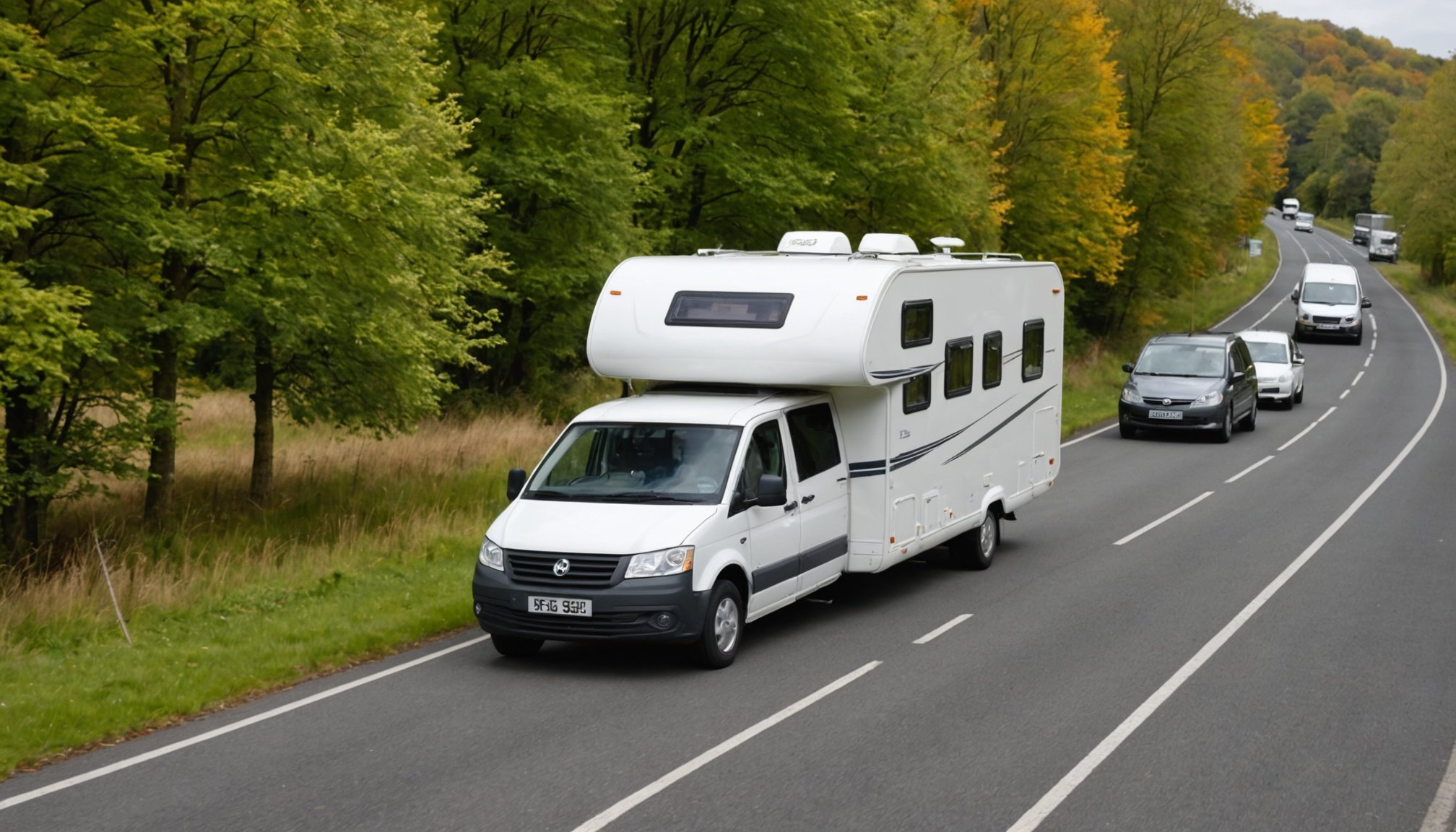Legal Requirements for Towing Caravans in the UK
When towing a caravan in the UK, it’s vital to abide by specific legal requirements to ensure safety and compliance. First and foremost is understanding the necessary driving licenses. Drivers who obtained their license after January 1, 1997, may need a category B+E license to tow heavier caravans. This is a crucial distinction, as towing without the proper licensing could result in fines.
Caravan registration and documentation play an important role in compliance. While caravans don’t require a separate registration like other vehicles, owners should maintain valid insurance documents and proof of ownership. This documentation can be essential during roadside checks or when travelling abroad.
Also read : Essential Road Safety Guidelines for Cyclists and Drivers in the UK: Stay Safe on the Streets!
Different regulations apply to various types of caravans based on their weight. Lightweight caravans generally have fewer restrictions, allowing for easier compliance with towing licenses. On the other hand, heavier caravans may incur stricter regulations, necessitating specific vehicle capabilities and potentially additional requirements from road authorities.
Understanding and adhering to these legal requirements not only ensures a safe and hassle-free experience but also contributes to road safety by preventing instances of improperly equipped vehicles towing caravans they cannot safely handle.
Have you seen this : Essential Qualifications for HGV (Heavy Goods Vehicle) Drivers in the UK: A Comprehensive Guide
Vehicle Specifications for Towing
When considering vehicle requirements for towing a caravan, understanding your vehicle’s towing capacity is crucial. This involves knowing the maximum weight your vehicle can safely and legally tow, which varies among different makes and models. Checking the owner’s manual or consulting the manufacturer is recommended to gain precise details about a vehicle’s towing capabilities.
Matching the caravan weight to your vehicle’s specifications is vital for safety. Overloading a vehicle can lead to dangerous handling and increased wear on components, risking both safety and incurring penalties for non-compliance with legal limits. It is advisable to ensure that the combined weight of the caravan and cargo does not exceed the vehicle’s towing capacity.
To enhance caravan compatibility, certain vehicle modifications can be beneficial. A heavy-duty suspension system and towing mirrors might improve stability and visibility. Additionally, installing a robust tow bar designed specifically for caravans can provide a more secure connection.
Ultimately, observing these vehicle requirements for towing ensures a safer and smoother journey, promoting better handling and reducing the risk of accidents. Understanding your vehicle’s limits and adjusting accordingly proves both practical and essential for a successful caravan adventure.
Safety Guidelines While Towing
Ensuring towing safety is paramount for a secure journey, requiring a focus on caravan stability and overall road safety. Before setting out, it’s essential to properly secure the caravan. This includes checking that all locks are fastened and ensuring the caravan is evenly loaded to prevent swaying, which contributes to a more stable and controlled towing experience.
Maintaining stability while driving is crucial. For instance, avoiding sudden movements or sharp turns helps keep the caravan steady. It’s advisable to maintain a consistent speed and leave ample space between vehicles to allow for safe braking distances. Using an anti-sway bar can also enhance stability, diminishing the risk of fishtailing.
Utilizing common safety equipment is a proactive step every tower should take. Installing towing mirrors will enhance visibility, while employing a breakaway cable can ensure the caravan stops if disconnected. Additionally, tyre pressure monitors provide real-time updates, keeping you informed of any potential issues.
By integrating these safety guidelines, drivers enhance not only their own protection but also contribute significantly to the safety of others on the road, ensuring a peaceful and enjoyable journey.
Insurance Considerations for Towing
When towing, having the right towing insurance coverage is essential to protect both your vehicle and caravan from unforeseen events. It’s important to verify that your existing policy covers the caravan as an extension of your vehicle. Coverage requirements differ across insurance providers, thus reviewing your policy’s specifics is crucial.
Liability insurance is an integral component, offering protection in case of accidents where damage to another party’s property or injuries occur. This coverage ensures that you are financially safeguarded against claims made by third parties in towing incidents.
There are specialized coverage options tailored for caravans, encompassing risks like theft, damage due to weather conditions, and breakdowns. These policies sometimes include roadside assistance, making it easier to address mechanical issues.
Understanding your liability becomes even more pressing when towing heavier caravans, as the potential impact during an accident can be more significant. Comprehensive insurance provides peace of mind, covering a wider range of possible scenarios on the road.
In short, investing time in selecting appropriate towing insurance shields you from potential liabilities, ensuring that your journey remains stress-free and financially protected against unforeseen mishaps.
Weight Limits and Compliance Penalties
Navigating weight regulations for towing caravans in the UK is imperative to avoid fines and ensure safe travel. Towing limits are designed to prevent overloading, which can compromise road safety. Various caravan types have specific weight thresholds that dictate what vehicles can legally tow them. These limits are clearly outlined in official guidance and depend on the Gross Train Weight (GTW) of both the towing vehicle and the caravan.
Exceeding these legal weight limits not only endangers the driver and other road users but also attracts penalties. Consequences include fines, points on your driving license, or even prosecution in severe cases. Roadside checks are regularly conducted to enforce these regulations, and drivers caught violating them may face immediate action.
Moreover, compliance is closely monitored by weighing caravans and comparing them against registered weights in databases. Ensure that your caravan’s weight, including passengers and cargo, doesn’t surpass the prescribed limits for your specific setup. Staying within legal bounds means investing time in understanding these weight regulations, thereby facilitating a smoother, stress-free journey and contributing to overall road safety.
Practical Tips for Successful Towing
Embarking on a caravan journey? Preparation is key. Begin with essential pre-trip checks, ensuring the caravan weight aligns with your vehicle’s specifications. Verify towing licenses to avoid legal hitches.
Next, address the vehicle. Inspect tyres for correct inflation levels and good tread—vital for stability. Ensure brakes, lights, and towing equipment function flawlessly. This diligence equips you against potential breakdowns.
Strategically plan your route. Consider roads that accommodate your caravan’s size and weight regulations. Familiarise yourself with rules for roadside assistance and emergency contacts along the route. Unforeseen challenges are less daunting with a well-researched contingency plan.
Moreover, mastering towing tips like maintaining consistent speeds and generous following distances aids manoeuvrability. Sudden speed shifts or sharp turns are culprits of instability.
For novices, immersing in resources tailored for new towers enhances familiarity and confidence. Training courses provide practical insight into handling and safety protocols.
Tools like tire pressure monitors and high-quality towing mirrors amplify safety. These steps converge to make your caravan expedition a seamless blend of preparation, safety, and compliance.
Armed with these best practices, you’re set for an efficient caravan escapade.
Useful Resources and Official Links
Embarking on a caravan adventure requires thorough preparation and familiarity with Caravan resources. Accessing reliable information is key for both seasoned travelers and those new to towing. The UK government provides comprehensive towing guides which detail the legal requirements for towing caravans, including license and weight regulations.
For precise guidance, exploring government websites like Gov.uk offers updated information on regulations and compliance. These sites are instrumental in informing users about necessary towing licenses and caravan registration processes. They often include resources such as step-by-step checklists and weight calculators, ensuring drivers meet all statutory requirements.
In addition, several organizations offer invaluable support and advice. Clubs such as The Caravan and Motorhome Club or Camping and Caravanning Club provide expert insights and practical workshops tailored for caravan owners. Membership in these organizations often grants access to exclusive publications and community advice forums, enhancing one’s understanding of towing intricacies.
Finally, official publications outlining caravan safety and maintenance enhance journey preparedness. Whether through printed materials or online portals, these resources empower drivers to navigate their caravan experiences confidently, armed with accurate and comprehensive information.











